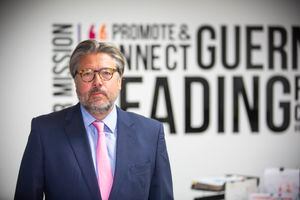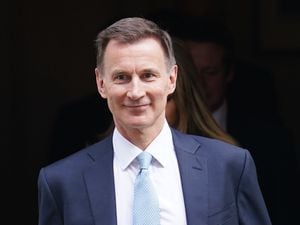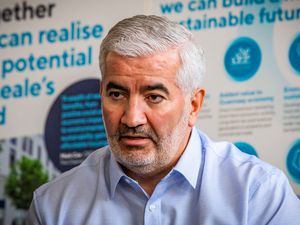Global Guernsey
Rupert Pleasant, chief executive of Guernsey Finance, is a man with a plan to showcase the island’s expertise globally and gain new business from Hong Kong to the US, as Will Green found out when they met

ASSURED. Enthusiastic. Focused. That’s the immediate impression one gains of the new chief executive as we chat in the offices of Guernsey Finance, the body charged with supporting and promoting the island’s finance sector.
Rupert Pleasant, who took up the role in June, is unabashed in declaring that he has always wanted to be chief executive of Guernsey Finance.
Acknowledging his delight at getting the job, Rupert praises his predecessor Dominic Wheatley and talks about having to ‘fill some very large shoes’.
‘This has been the job that I’ve wanted for quite a long time, to be perfectly honest,’ says Rupert.
‘When you’ve worked in a number of different overseas jurisdictions, you’d be surprised what an enviable reputation Guernsey actually does have. I’ve seen the other side of the coin and I’ve sat in other jurisdictions.
‘I’ve looked from the outside in. We are seen as a centre of excellence for financial services.
‘All our kind of core values – the security, the stability, the substance – it is recognised internationally that Guernsey provides all these huge advantages.
‘So when the job came up, to me it was a no-brainer.’
It’s also quickly apparent that Rupert’s global perspective informs how he sees the agency develop in further bolstering the profile of Guernsey’s finance industry internationally. His career has taken him from Guernsey to the UK, Hong Kong, South Africa and Switzerland in a string of senior roles before returning to his home island.
Strategy and opportunities – Asia, the Middle East, the US and UK
For him, there are opportunities for Guernsey amid a period of change across the globe. ‘The strategy that we’ve got in place, which is actually being reviewed at the moment, remains solid. Obviously we engage with industry on a regular basis. We don’t just sit alone and pontificate at the top. We listen to what industry is saying and we seek their input on strategy,’ says Rupert.
‘Our strategy is good at the moment. However, there are three things that I would like to focus on. We’ve got a great message, the job that the agency does, how we portray ourselves, I think is absolutely first class. We’ve got some great people here. However, I think we fall short sometimes in being able to get that message out as widely as we’d like.
‘To address that in some way would be great, because we do have a very, very positive message to get out there.
‘I would like to see us do some more academic research. Showing that we are a serious player in our chosen markets is hugely important. Having that kind of academic depth, it does prove to those that read it in a way that you know we are a very serious player on the international stage.
‘Then you can use that kind of academic firepower to build the PR behind it and then get that out into the market.’
On business development, Rupert considers that the agency is generally in the right geographical areas but would like to bolster its presence in key markets. Alongside the core market of the UK, Hong Kong, the Middle East and the US are critical markets to develop. Crucial for that is having boots on the ground – experts able to connect to the end clients as well as their advisors, and speak the local business language. They can then sell the island’s core strengths of stability and security, an attractive proposition in these times.
In the Middle East, Rupert sees huge opportunities in Saudi Arabia, Bahrain and Kuwait. In the US, the industry is keen to have a presence in New York. He also sets out activity in relation to Hong Kong, saying: ‘One of the things that I do enjoy about Guernsey Finance, even though I’ve been relatively new to the job, is that we can be very nimble. If we see an opportunity there then we can look to put some good planning and good people in place to meet that opportunity.
‘So from a Hong Kong side, we are putting a steering committee in place at the moment with some very experienced and very seasoned professionals who have got a great deal of experience in that region.
‘We’re also looking to bolster our presence in Hong Kong as well. We have a staff member on the ground at the moment, we’re looking to add to that with another very seasoned professional on the ground there. We’ve got to be very careful in how we look at these opportunities, but there’s always been a great relationship between the territory and Guernsey. From our point of view it’s showing our credentials out there, showing that, very much on the security and the stability side, that as an island we have much to offer.
‘We also working very closely with our colleagues at Locate Guernsey as well. So Jo Stoddart and her team are also on that steering group as well because as an island, we need to put that consolidated projection in place. We can’t just stand alone on this and I think going forward, we will be working more closely with other agencies within the island.’
Travel?
We also talk about the impact of travel restrictions brought in to control the spread of coronavirus. These are focused on the requirement for travellers coming and returning to the Bailiwick to self-isolate for 14 days, although limited plans have been drawn up for so-called same-day business tunnels with strict public health guidance in place.
‘It’s not a serious issue at present,’ reports Rupert. ‘Again, speaking to industry, there is still good pipeline in play at the moment. New business is coming into the island, which is obviously very heartening.
‘I also think there has been a mind-set change that people are very comfortable with using the likes of Zoom, Microsoft Teams and whatever. So we’re keeping relationships going using digital media now. So I think those are two positives. Even if we were to fly to London at the moment, there’s nobody in the offices.
‘I have a number of friends who work in London who aren’t really expecting to go back to the office this side of October, or this year at all. London is still our key market and if it means that we have to fly back and forth and can’t do it, at present, I don’t think it’s too detrimental.
‘However, the pipeline will dry up at some stage. People still do business with people on a one-to-one basis. Existing clients need to be serviced and a number of the older generation certainly.
‘Some of this falls into a bit of a generation thing as well. I think the younger generation are quite happy to act digitally. However, the older generation like to do things face to face. So I think there will come a time where we will need to open our borders and travel will become essential again.’
Post-Brexit trading and sustainable finance
Another challenge is the UK-EU trading relationship, although Guernsey is already recognised as a third country by the EU. The chief executive of Guernsey Finance says that a ‘hard Brexit’ could be the outcome but is upbeat about how that affects the island.
‘How we have always placed ourselves is a supporter of the City of London, we are a key component of what they offer.
‘Not only will we continue to be able to offer that service to them, I think we will actually become more important because we can then become a conduit and help them sustain different markets as well,’ he says.
A move towards sustainable finance is another key part of the strategy to drive future success. But Rupert stresses that one cannot be complacent and there is a need to build real substance to provide reassurance to investors and the markets, such as the Guernsey Green Fund product that offers a green kitemark. Developing a similar kitemark for the insurance sector is an initiative already under way, he adds.
‘We are doing it the right way, but we can’t get complacent about it because there are other jurisdictions who are snapping at our heels and have seen it is a valuable tool, a valuable resource, to have under your belt.’
Revive and Thrive
To enable him to take forward his plan, Rupert acknowledges that he is looking to the States to increase funding for the agency. Going to industry, he says, would be difficult in the current circumstances given the economic impact of the Covid-19 pandemic.
‘We have drawn up a strategy paper which pretty much revolves around what we have discussed here. It’s in discussions at the moment,’ continues Rupert.
Underlining his belief in the finance sector as a force for good, he concludes that it can play a key part in the States’ ‘Revive and Thrive’ recovery strategy from the pandemic. ‘I fully believe that we can absolutely do that because we have got the expertise. We have everything ready on the island. It’s just putting us in a position to go and really get that message out there.’





